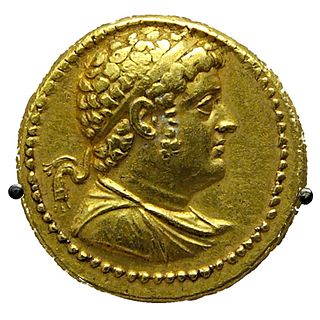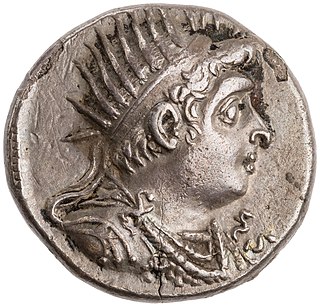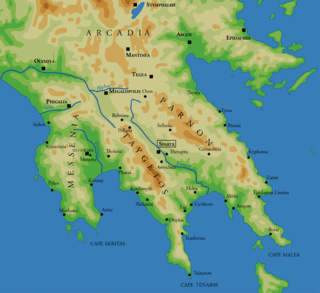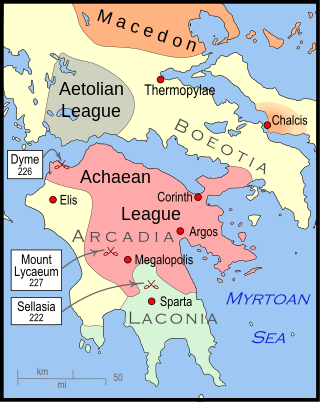Life
Hippomedon was a son of Agesilaus, the uncle of Agis IV. He must have been older than his cousin Agis, as he is said by Plutarch to have already distinguished himself on many occasions in war when the young king first began to engage in his constitutional reforms. [2] Hippomedon entered warmly into the schemes of Agis, and was mainly instrumental in gaining over his father Agesilaus to their support. But the latter sought in fact only his own advantage, under the cloak of patriotism; and during the absence of Agis, on his expedition to Corinth to support Aratus, he gave so much dissatisfaction by his administration at Sparta, that Leonidas II was recalled by the opposite party, and Agesilaus was compelled to flee the city. Hippomedon shared in the exile of his father, though he had not participated in his unpopularity. [3] At a subsequent period he was the governor of those cities of Thrace which were subject to Ptolemy III Euergetes. [4] We learn from Polybius [5] that he was still living at the death of Cleomenes III in 219 BC, when the crown would have devolved of right either to him or to one of his two grandchildren, the sons of Archidamus V, who had married a daughter of Hippomedon; but their claims were disregarded, and Lycurgus, a stranger to the royal family, was raised to the throne.
Agesilaus II was king of Sparta from c. 400 to c. 360 BC. Generally considered the most important king in the history of Sparta, Agesilaus was the main actor during the period of Spartan hegemony that followed the Peloponnesian War. Although brave in combat, Agesilaus lacked the diplomatic skills to preserve Sparta's position, especially against the rising power of Thebes, which reduced Sparta to a secondary power after its victory at Leuctra in 371 BC.
Year 241 BC was a year of the pre-Julian Roman calendar. At the time it was known as the Year of the Consulship of Atticus and Cerco. The denomination 241 BC for this year has been used since the early medieval period, when the Anno Domini calendar era became the prevalent method in Europe for naming years.
This article concerns the period 249 BC – 240 BC.

Ptolemy III Euergetes was the third pharaoh of the Ptolemaic dynasty in Egypt from 246 to 222 BC. The Ptolemaic Kingdom reached the height of its military and economic power during his kingship, as initiated by his father Ptolemy II Philadelphus.
Year 243 BC was a year of the pre-Julian Roman calendar. At the time it was known as the Year of the Consulship of Fundulus and Galus. The denomination 243 BC for this year has been used since the early medieval period, when the Anno Domini calendar era became the prevalent method in Europe for naming years.

Ptolemy IV Philopator was the fourth pharaoh of Ptolemaic Egypt from 221 to 204 BC.
The polis of Sparta was the greatest military land power of classical Greek antiquity. During the Classical period, Sparta governed, dominated or influenced the entire Peloponnese. Additionally, the defeat of the Athenians and the Delian League in the Peloponnesian War in 431–404 BC resulted in a short-lived Spartan dominance of the southern Greek world from 404 to 371 BC. Due to their mistrust of others, Spartans discouraged the creation of records about their internal affairs. The only histories of Sparta are from the writings of Xenophon, Thucydides, Herodotus and Plutarch, none of whom were Spartans. Plutarch was writing several centuries after the period of Spartan hegemony had ceased. This creates difficulties in understanding the Spartan political system, which was distinctly different from any other Greek polis.

Cleomenes III was one of the two kings of Sparta from 235 to 222 BC. He was a member of the Agiad dynasty and succeeded his father, Leonidas II. He is known for his attempts to reform the Spartan state.

Ptolemy VIII Euergetes II Tryphon, nicknamed Physcon, was a king of the Ptolemaic dynasty in Egypt. He was the younger son of King Ptolemy V and Queen Cleopatra I. His reign was characterised by fierce political and military conflict with his older siblings, Ptolemy VI and Cleopatra II.
Agis II was the 18th Eurypontid king of Sparta, the eldest son of Archidamus II by his first wife, and half-brother of Agesilaus II. He ruled with his Agiad co-monarch Pausanias.
Agesipolis I was the twenty-first of the kings of the Agiad dynasty in ancient Sparta.

Agis IV, the elder son of Eudamidas II, was the 25th king of the Eurypontid dynasty of Sparta. Posterity has reckoned him an idealistic but impractical monarch.

Leonidas II was the 28th Agiad King of Sparta from 254 to 242 BC and from 241 to 235 BC.

The Battle of Sellasia took place during the summer of 222 BC between Macedon and the Achaean League, led by Antigonus III Doson, and Sparta under the command of King Cleomenes III. The battle was fought at Sellasia on the northern frontier of Laconia and ended in a Macedonian-Achaean victory.
Andromachus was a Seleucid Greek nobleman. Andromachus was the son of Achaeus who was a wealthy nobleman who owned estates in Anatolia. His family was influential in Anatolia and had strong royal connections. Andromachus had three siblings; one brother: Alexander and three sisters: Antiochis, Laodice I and Laodice II. Andromachus was the father of Achaeus and his sister Laodice II was married to the Seleucid King Seleucus II Callinicus. As a result of this marriage, the future Seleucid kings, Seleucus III Ceraunus and Antiochus III the Great, were his nephews.
Lysimachus was a son of king Ptolemy Philadelphus by Arsinoe, the daughter of Lysimachus, king of Thrace. He survived both his brother Ptolemy III Euergetes and his nephew Magas of Egypt, but was not much later put to death by Sosibius, the minister and guardian of Ptolemy IV Philopator.
Phylarchus was a Greek historical writer whose works have been lost, but not before having been considerably used by other historians whose works have survived.

The Cleomenean War was fought between Sparta and the Achaean League for the control of the Peloponnese. Under the leadership of king Cleomenes III, Sparta initially had the upper hand, which forced the Achaean League to call for help the Macedonian king Antigonos Doson, who decisively defeated Cleomenes in the battle of Sellasia in 222.
The Agiad dynasty was one of the two royal families of Sparta, a powerful city-state of Ancient Greece. The Agiads were seniors to the other royal house, the Eurypontids, with whom they had an enduring rivalry. Their hypothetical founder was Agis I, possibly the first king of Sparta at the end of the 10th century BC, who gave his name to the dynasty. The last Agiad king was Agesipolis III, deposed by the Eurypontid Lycurgus in 215 BC. Their most famous member was most certainly Leonidas I, known for his heroic death at the battle of Thermopylae in 480 BC.
Agesilaus was a Spartan statesman, the uncle of Agis IV, and the father of Hippomedon. When Agis IV began his constitutional reforms in Sparta, Hippomedon entered warmly into the schemes of Agis, and was instrumental in gaining over Agesilaus to their support. Agesilaus was a man of large property, but who, being deeply involved in debt, hoped to profit by the reforms of Agis. Under the cloak of patriotism, and during the absence of Agis on his expedition to Corinth to support Aratus, Agesilaus gave so much dissatisfaction by his administration at Sparta, that Leonidas II was recalled by the opposite party, and Agesilaus was compelled to flee the city, aided by his son.
![]() This article incorporates text from a publication now in the public domain : Smith, William, ed. (1870). Dictionary of Greek and Roman Biography and Mythology .
This article incorporates text from a publication now in the public domain : Smith, William, ed. (1870). Dictionary of Greek and Roman Biography and Mythology .





